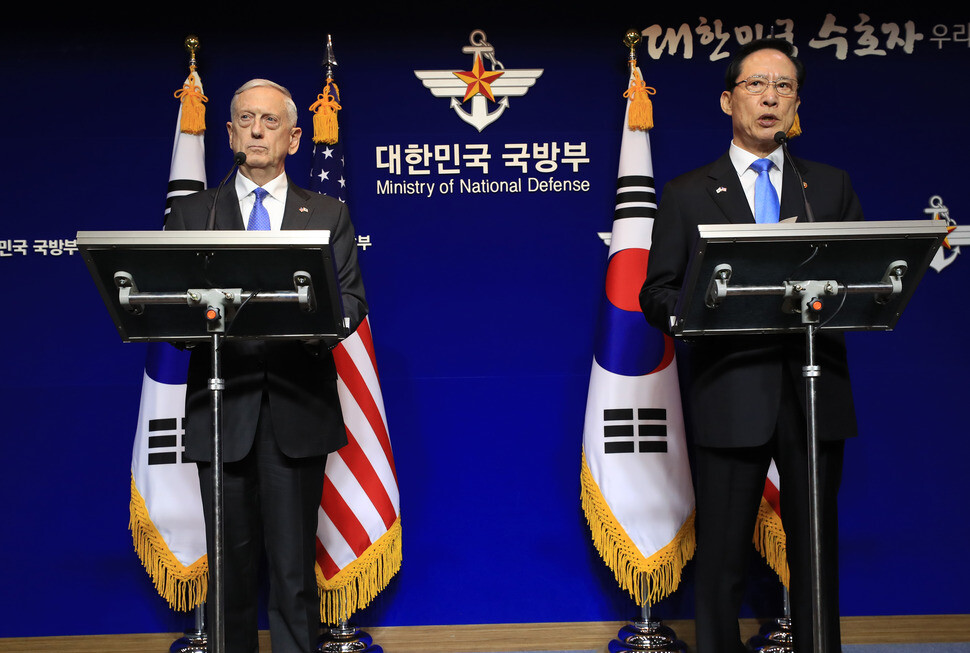hankyoreh
Links to other country sites 다른 나라 사이트 링크
Plans for early return of wartime OPCON transfer to be developed by next year

South Korea and the US plan to jointly develop a plan by late 2018 for the early return of wartime operational control (OPCON) to South Korea. A senior Ministry of National Defense official said on Oct. 29 that Minister of National Defense Song Young-moo and US Secretary of Defense James Mattis agreed at their bilateral Security Consultative Meeting (SCM) the day before to “comprehensively re-examine the OPCON transfer plan and work together on supplementing and developing it, with results to be reported at next year’s SCM.”
After agreeing to an additional postponement of the OPCON transfer during the Park Geun-hye administration in Oct. 2014, South Korean and US authorities agreed to carry out the transition once certain conditions were met and developed an implementation plan for it. The latest agreement calls for re-examining that plan, in what is being seen as an effort to move up the date of the OPCON transfer.
If South Korea and the US do jointly come up with new plan for the transfer by the time of the next SCM in Oct. 2018, it will require a full-scale push afterwards for an early OPCON transition. While South Korean President Moon Jae-in pledged a transfer “within my time in office” during his election campaign [earlier this year], he relaxed his stance in favor of an “ahead-of-schedule” transfer after a South Korea-US summit in June.
In a joint statement issued on Oct. 28 after the SCM - the highest-level consultative body between South Korean and US defense officials - Song and Mattis said they had “pledged to make joint efforts to implement steadily the decision by President Trump and President Moon in June 2017 to enable the expeditious conditions-based transfer of wartime operational control.” The two ministers also said they were “were updated on the draft organization of the future Combined Forces Command from the MCM [Military Committee Meeting] and decided to continue to refine the draft through combined exercises and certification.”
Of the agreement, a senior military official said the two sides had “reaffirmed a basic agreement that the future allied command to take the place of the current South Korea-US Combined Forces Command after the OPCON transfer would have the South Korean military as commander and the US military as deputy commander” and “agreed to continued discussions on a specific draft organization.”
Meanwhile, Mattis reaffirmed at a post-SCM news conference on Oct. 28 that the US is prioritizing a diplomatic resolution to the North Korean nuclear issue.
“In terms of military options that we have [toward North Korea,] they are designed to keep the peace, to reinforce diplomats, to make certain diplomats from the United Nations anywhere in the world are speaking from a position of strength,” he said.
At the same time, Mattis stressed, “Our combined effort is to deter that sort of [North Korean] threat [to peace and stability] or to have military options, many different military options, that would realistically reduce that threat as low as possible. And yes, we do have those options. The DPRK is overmatched [against] the Republic of Korea-United States alliance.”
“In conjunction with the agreement made by the ROK and the US presidents to expand rotational deployment of US strategic assets, we have agreed to expand relevant cooperation, including joint studies to improve the implementation of extended deterrents and commitments,” Song added.
By Park Byong-su, senior staff writer
Please direct questions or comments to [english@hani.co.kr]

Editorial・opinion
![[Guest essay] Preventing Korean Peninsula from becoming front line of new cold war [Guest essay] Preventing Korean Peninsula from becoming front line of new cold war](https://flexible.img.hani.co.kr/flexible/normal/500/300/imgdb/original/2024/0507/7217150679227807.jpg) [Guest essay] Preventing Korean Peninsula from becoming front line of new cold war
[Guest essay] Preventing Korean Peninsula from becoming front line of new cold war![[Column] The state is back — but is it in business? [Column] The state is back — but is it in business?](https://flexible.img.hani.co.kr/flexible/normal/500/300/imgdb/original/2024/0506/8217149564092725.jpg) [Column] The state is back — but is it in business?
[Column] The state is back — but is it in business?- [Column] Life on our Trisolaris
- [Editorial] Penalties for airing allegations against Korea’s first lady endanger free press
- [Editorial] Yoon must halt procurement of SM-3 interceptor missiles
- [Guest essay] Maybe Korea’s rapid population decline is an opportunity, not a crisis
- [Column] Can Yoon steer diplomacy with Russia, China back on track?
- [Column] Season 2 of special prosecutor probe may be coming to Korea soon
- [Column] Park Geun-hye déjà vu in Yoon Suk-yeol
- [Editorial] New weight of N. Korea’s nuclear threats makes dialogue all the more urgent
Most viewed articles
- 1[Guest essay] Preventing Korean Peninsula from becoming front line of new cold war
- 2Yoon’s broken-compass diplomacy is steering Korea into serving US, Japanese interests
- 360% of young Koreans see no need to have kids after marriage
- 4[Reporter’s notebook] In Min’s world, she’s the artist — and NewJeans is her art
- 5After 2 years in office, Yoon’s promises of fairness, common sense ring hollow
- 6S. Korean first lady likely to face questioning by prosecutors over Dior handbag scandal
- 7[Column] Why Korea’s hard right is fated to lose
- 8AI is catching up with humans at a ‘shocking’ rate
- 9[Column] The first year of war in Ukraine
- 10‘Weddingflation’ breaks the bank for Korean couples-to-be